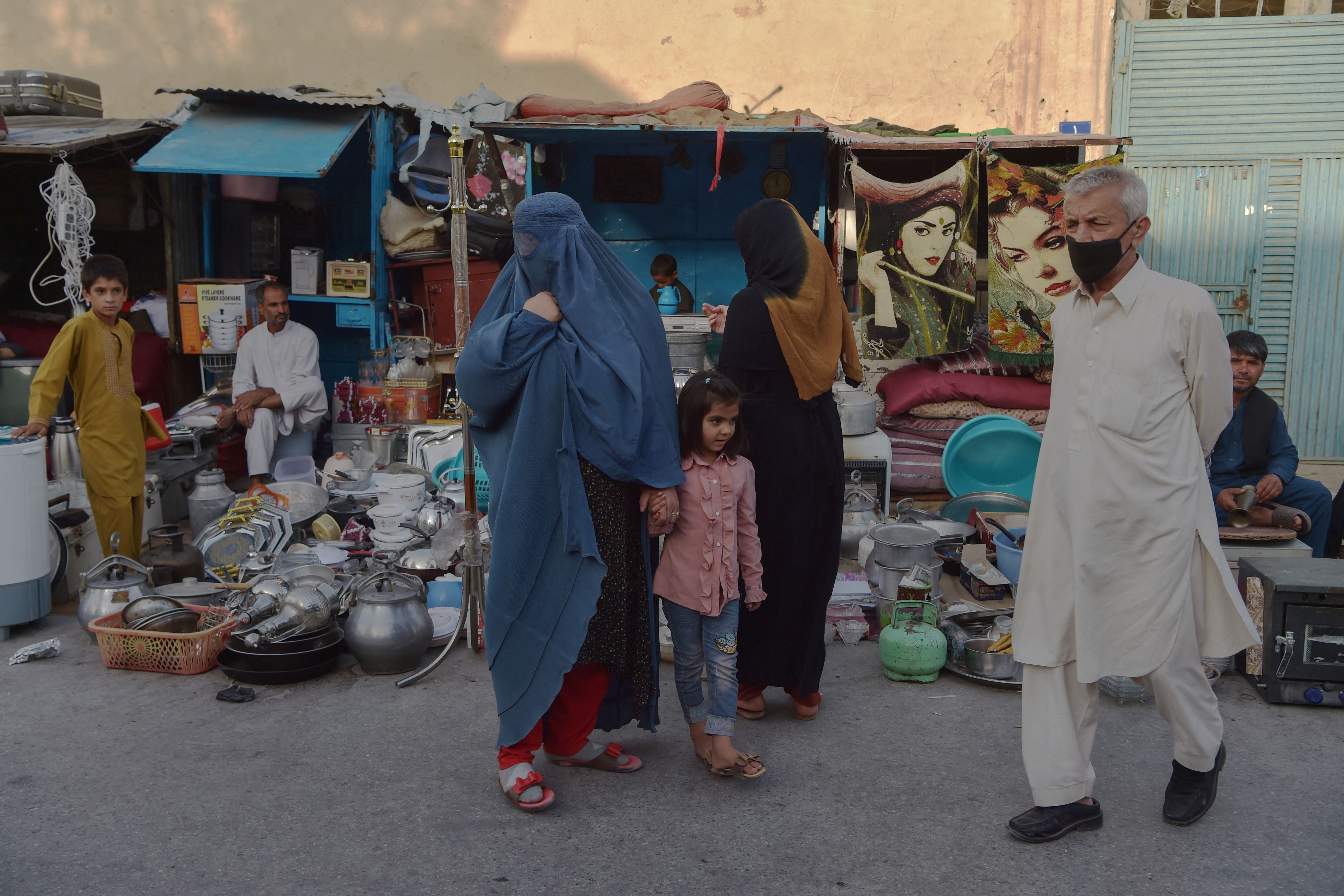The Independent's journalism is supported by our readers. When you purchase through links on our site, we may earn commission.
How not to be a ‘white savior’ when you talk about women in Afghanistan and Texas
‘The Taliban would love the Texas abortion law,’ Stephen King wrote this week. It was disappointing to see


Your support helps us to tell the story
From reproductive rights to climate change to Big Tech, The Independent is on the ground when the story is developing. Whether it's investigating the financials of Elon Musk's pro-Trump PAC or producing our latest documentary, 'The A Word', which shines a light on the American women fighting for reproductive rights, we know how important it is to parse out the facts from the messaging.
At such a critical moment in US history, we need reporters on the ground. Your donation allows us to keep sending journalists to speak to both sides of the story.
The Independent is trusted by Americans across the entire political spectrum. And unlike many other quality news outlets, we choose not to lock Americans out of our reporting and analysis with paywalls. We believe quality journalism should be available to everyone, paid for by those who can afford it.
Your support makes all the difference.My Instagram feed is a sea of blue burkas and impassioned calls to action. Afghan women need to be “saved”, yet again, as activists across the globe fear the worst for group of females whose freedoms will likely be trampled by the Taliban. The narrative was similar 20 years ago, when photos of burka-clad women were plastered on television screens and front pages of newspapers, forming a part of the US’s propaganda campaign inciting support for the invasion of Afghanistan. It provoked an outcry from westerners, for whom these full-coverage garments symbolized an affront to their fundamental ideals of enlightenment and individualism.
Yet the hypocrisy of the situation is all too clear. The activism for Afghan women seems conveniently selective — when armed, bearded extremists are the ones stifling their rights, there’s a global outcry. But when women were abused and assaulted at the hands of the American-backed Afghan government before the Taliban’s takeover, the international community remained silent.
We’ve been regrettably choosy when it comes to our activism for female body autonomy, especially when “Islamic” garments are involved. Take burkas for example — garments that the Taliban has required for women the past, yet are also the attire of choice for some Muslim women who appreciate the comfort, modesty, anonymity and cultural significance they provide. If they were truly concerned with championing women’s rights to dress how they please, then activists who condemn the enforcement of these full-coverage cloaks would speak up for women in France, and other areas of Europe and Canada, where Muslims who choose to cover their hair or faces have been banned from wearing their hijabs and niqabs. Burkinis, which offer Muslim women a chance to enjoy the pool and beach without worrying about showing skin, are also forbidden in some towns. Conversely, white, European athletes who made public endorsements for modesty over the summer — from the Norwegian handball team that traded in their bikini bottoms for shorts, to the German gymnasts who opted for wrist and ankle-length suits instead of leotards at the Olympics — were applauded for standing up against sexism.
The double standards are glaring; the selective activism disheartening; the entire situation eye-opening. Welcome to the world of the white savior, where white people benevolently help people of color develop, advance and modernize, and in the process, do away with the cultural clothing they deem “backwards”. It may be well-intended and altruistically motivated, but it’s also incredibly ignorant.
White savior syndrome goes hand-in-hand with white feminism, which focuses on the struggle for empowerment and equality from the lens of the white woman, without addressing the diverse circumstances of often less privileged women of color. Feminism itself is a word that’s widely contested and diversely interpreted. It’s why, when I identify as a Muslim feminist and write that the Taliban is a repressive regime and a danger to women, I’m accused by some Muslim men of pandering to “western propaganda” that legitimizes the US invasion of Afghanistan. I’ve been called an “unbeliever” and “cannon fodder for the west” for simply identifying myself that way in the past. I, a Muslim woman of Pakistani heritage, am painted as a white savior.
Many commentators over the past few weeks have claimed that when it comes to Afghan women, 20 years of “progress” (credited to the west) will be undone. Meanwhile, Americans have bizarrely begun blaming their own “backwards” and controversial policies on the “repressiveness” of the Middle East, somehow transposed onto the lands of the Lone Star State. A new law in Texas that bans abortions after six weeks of pregnancy has led to critics comparing the policy to “sharia”. On Twitter, author Stephen King stated, “The Taliban would love the Texas abortion law” (with over 5,000 retweets and 38,000 likes.) Obviously, Texas’s archaic abortion ban has nothing to do with “sharia” or the Taliban — in fact, many interpretations of sharia are far more liberal when it comes to abortion. Islamic schools of jurisprudence disagree on its permissibility, and at which stage of pregnancy it becomes forbidden: some scholars allow abortion up until 120 days (17 weeks) after conception. As one woman on Twitter pointed out, abortions are legal in Afghanistan under certain circumstances, and women now have more reproductive rights under the Taliban than in Texas.
This tendency to instantly blame “the other” rather than look inwards and confront America’s own problematic history of controlling women’s bodies (often influenced by Christian patriarchy) shows that prejudices about Muslims are deeply entrenched. They are manifested not only in white savior spiels but also whenever domestic issues arise that require easy — even if unrelated — enemies.
Some might argue that the risk of falling into the white savior trope is a small price to pay for raising awareness about women’s rights being trampled by the Taliban. But, aside from perpetuating colonialist stereotypes, it also threatens to alienate the community that has the potential to be actual change-makers in improving the treatment of Muslim women. For while the west might have swooped in, dropping bombs and drone strikes with one hand and posing for photos while cradling babies with the other, it has officially departed, and it is the local Afghan community that will now determine the fate of its women. News stories written with white savior undertones might tug at the heartstrings of a bunch of westerners, but will make little difference in the day-to-day lives of women in Afghanistan, and could threaten to incite the decision-makers of a nation that’s had its fill of invaders and occupiers — and their imperialist ideals.
So, how exactly should the west fairly and effectively report on human rights violations against women under the Taliban? We should start by familiarizing ourselves with the complex history of Afghanistan, a nation that has faced foreign interference since the 70s. We should seek out Afghan women — refugees or those still in the country — and listen to how they believe we can best help. We should understand that women from urban areas like Kabul live markedly different lifestyles to women in rural villages, and may have different perspectives and expectations regarding their rights and roles in society.
Attorney, author and human rights activist Rafia Zakaria’s newly-released nonfiction book, Against White Feminism, seems like a good starting point to educating ourselves about these nuances. According to her recent tweets, her book will argue that sexual liberation is not the sum total of women’s empowerment — and with blue burkas, burkinis and hijab bans still on my mind, I can’t wait to dig in.
Join our commenting forum
Join thought-provoking conversations, follow other Independent readers and see their replies
Comments